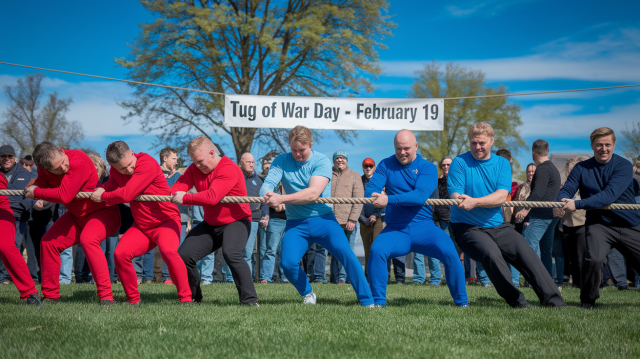Tug of War Day, observed annually on February 19, is a celebration of the timeless sport of tug of war, which embodies teamwork, strategy, and friendly competition. This day brings people together across cultures and communities to honor the spirit of collaboration and collective strength. Whether through formal tournaments or casual games, Tug of War Day is a reminder of the importance of unity and perseverance.
Why Is Tug of War Day Celebrated?
Tug of War Day is celebrated to recognize the historical and cultural significance of this ancient game. With roots in civilizations such as Egypt, Greece, and China, tug of war has been a symbol of strength and endurance for centuries. The day serves as a tribute to the values of teamwork and strategy while encouraging people to engage in physical activity and community bonding.
Cultural Significance
Tug of war holds a special place in cultural traditions worldwide:
- Historical Roots: The game was used in ancient times for military training and rituals.
- Global Appeal: It was an Olympic sport from 1900 to 1920 and continues to be played in festivals and events globally.
- Cultural Heritage: Variations like Vietnam’s “sitting tug-of-war” have been recognized by UNESCO as Intangible Cultural Heritage.
Communities celebrate this day uniquely:
- Hosting competitions at schools, workplaces, or local parks.
- Including tug-of-war matches in fairs or cultural festivals.
- Organizing international tournaments that draw participants from around the world.
Social Impact
Tug of War Day fosters social connections by bringing people together for shared experiences. It strengthens bonds within families, schools, and workplaces while promoting values like cooperation and sportsmanship. The simplicity of the game ensures inclusivity, making it accessible to people of all ages and abilities.
The Importance of Tug of War Day
Educational Value
The day provides an opportunity to learn about the history and cultural significance of tug of war while teaching lessons in teamwork, communication, and resilience.
Emotional Connection
Participating in or watching a tug-of-war match fosters emotional bonds among individuals. The shared effort required to succeed creates lasting memories and builds trust within teams.
Origin and Evolution
The origins of Tug of War Day are unclear, but the sport itself dates back thousands of years. Historically used for military training and ceremonial purposes, it gained popularity as a recreational activity during the late 19th century. Over time, the game evolved into an international pastime celebrated through formal competitions and informal gatherings.
How to Celebrate Tug of War Day
Here are some meaningful ways to observe this special day:
- Organize a Match: Gather friends, family, or colleagues for a fun competition.
- Learn Its History: Explore its cultural roots through books or documentaries.
- Community Engagement: Use the day for team-building activities or charity events.
- Share on Social Media: Use hashtags like #TugOfWarDay or #PullTogether to spread awareness.
Conclusion
Tug of War Day on February 19 is more than just a celebration of a game—it’s a tribute to teamwork, resilience, and shared joy. By participating in this global tradition, individuals can reflect on the importance of unity while enjoying moments filled with laughter and friendly rivalry. Whether you’re pulling for fun or competition, this day reminds us all that strength truly lies in working together.











